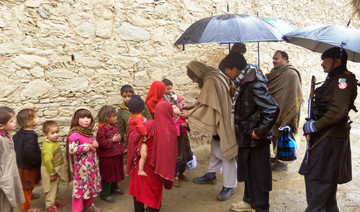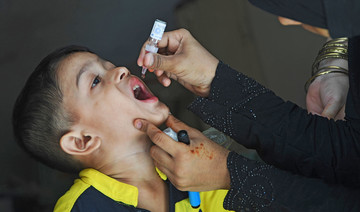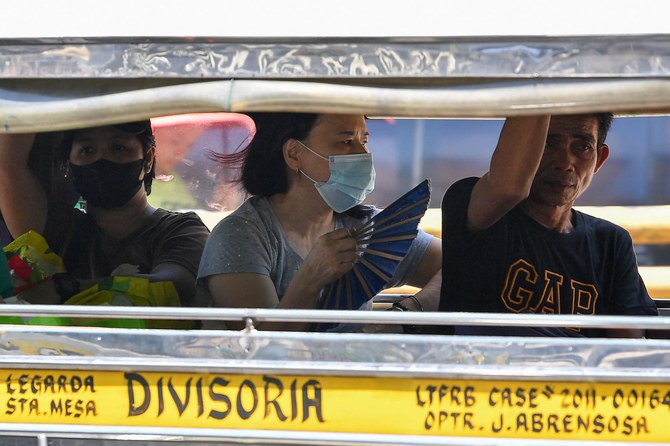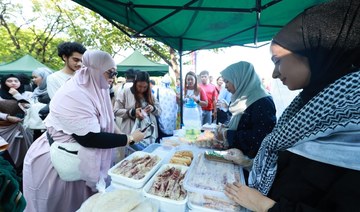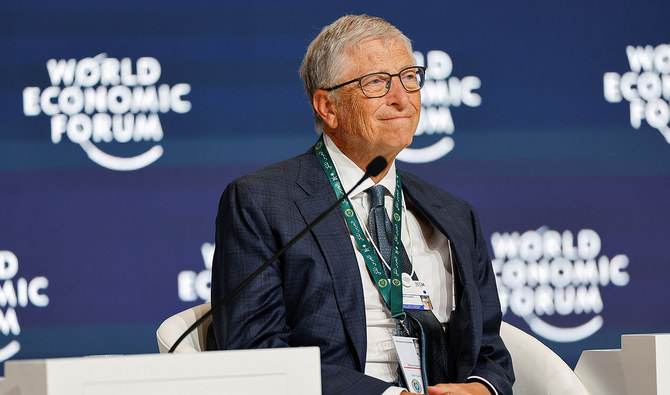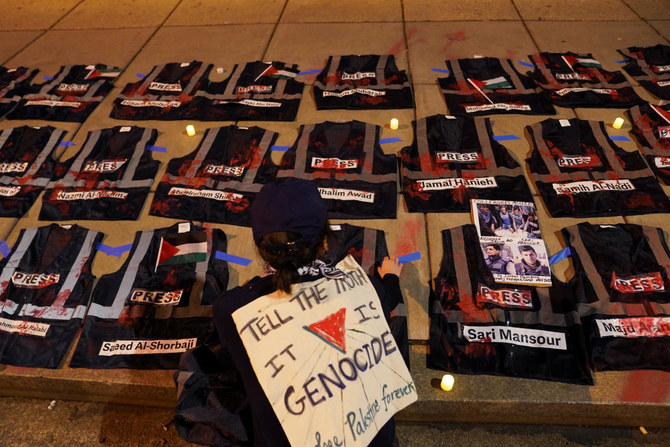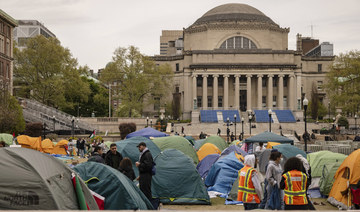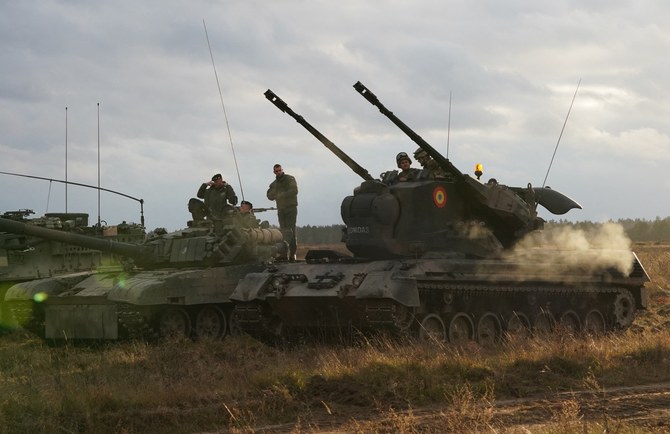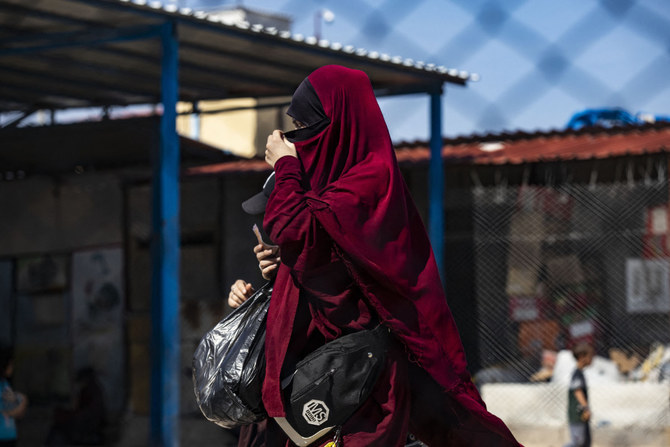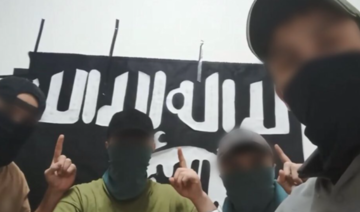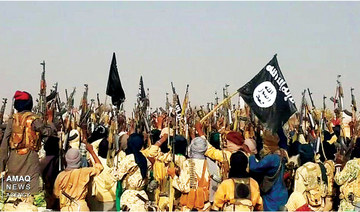DUBAI: Polio is on the verge of being completely eradicated thanks to “tremendous support” from the Middle East, but experts warn that unless the global community steps up to rid the world completely of the debilitating disease within a decade, 200,000 new cases of the disease could be diagnosed every single year.
As World Polio Day is marked across the globe on Wednesday, the Global Polio Eradication Initiative (GPEI) said while the disease is at the lowest ever levels – being 99 per cent on the way to being a polio-free world – unless more resources are mobilized to immunize children, save lives and protect communities, the disease could come "roaring back across the world.”
“Eradicating a disease is an all-or-nothing game… 99 percent is not good enough, you either eradicate or you do not,” said Oliver Rosenbauer, spokesperson for the GPEI. "And the danger is that because it is such a highly infectious disease, polio will always come back until the day that we eradicate it completely."
Rosenbauer told Arab News there are fewer polio cases reported from fewer areas than ever before and only three countries remain endemic: Nigeria, Pakistan and Afghanistan. Even within these countries, polio is more restricted than ever. This compares to 125 endemic countries and 350,000 annual cases 30 years ago.
However, warned Rosenbauer, its presence in recent cases in war-torn Syria and Papua New Guinea “underscores the risk” should the global community network fail to work together to relegate the disease – also known as wild poliovirus – to the history books.
Last year more than a dozen children in eastern Syria were paralyzed in an outbreak of polio, punctuating the health perils to a population devastated by war. It is the second outbreak of the disease to strike Syria since the war began in May 2011, and reflected the inability of health workers to immunize all children caught in conflict zones where sanitation is poor and access is difficult.
Just last month, a young boy died from polio in Papua New Guinea in the first fatal case since an outbreak of the disease in June. The country was declared polio-free in 2000, but the rate of vaccinations has been dropping in recent years and an outbreak was confirmed earlier this year.
"These outbreaks underscore the risk that if we do not eradicate polio now, estimates are that within 10 years, the disease will come roaring back across the world, and we will again see 200,000 new cases every single year, all over the world,” warned Rosenbauer. “Conflict and war tend to lead to a deteriorated health infrastructure, reduced vaccination rates, reduced sanitation infrastructure, hampered access etc, and this leaves children in such areas much more vulnerable to diseases such as polio.
"But the good news is that we know what needs to be done to achieve success, so it is within our hands to achieve a polio-free world. We need to fill the remaining immunity gaps in the remaining endemic countries, by vaccinating the last remaining unreached and unvaccinated children. And there are area-specific reasons why children might be missed, ranging from lack of infrastructure, to large-scale population movements, to inaccessibility, to resistance.”
World Polio Day was established by Rotary International to commemorate the birth of Jonas Salk, who led the first team to develop a vaccine against poliomyelitis. Use of this inactivated poliovirus vaccine and subsequent widespread use of the oral poliovirus, developed by Albert Sabin, led to the establishment of the GPEI in 1988. It is led by national governments with five partners: the World Health Organization; Rotary International; the US Centers for Disease Control and Prevention; UNICEF; and the Bill & Melinda Gates Foundation. They have, to-date, contributed about $3 billion toward eradicating the disease, and the number of cases have since been reduced by 99.9 percent.
At the World Health Assembly in 2012, 194 member states declared that the eradication of polio is a “programmatic emergency for global public health.” Rosenbauer said the Middle East has been an effective ally in eradicating the disease, with countries across the Gulf pledging both time and resources to international efforts to vaccinate children, including those living in the most remote and poorest places on the planet.
In 2011, Gates lauded Saudi Arabia after the Kingdom committed $30 million (SAR102.6 million) to eradication efforts, and earlier this year said he was also “extremely thankful for the generosity of the UAE,” which has pledged similar sums. At the 2013 Global Vaccine Summit in Abu Dhabi, international donors pledged $4 billion to fund GPEI’s new six-year plan to eradicate polio and eliminate the disease.
"We have tremendous support from governments, communities, parents, rotarians, health workers, traditional and religious leaders, all working towards a polio-free world,” said Rosenbauer. "This support ranges from ensuring the financial, technical and personnel resources are available, to improving infrastructure, sensitizing communities, to strengthening political support, to supporting the logistics of vaccination campaigns and disease surveillance.”
Thanks to this support, polio is beaten back to the lowest ever levels across the region. In Pakistan, 20 years ago polio paralyzed 35,000 children across the entire country every year. This year, four cases have been reported from a handful of districts. Saudi Arabia has been polio-free since 1995, while the UAE has been polio-free since 1992.
In Saudi Arabia, an Islamic group is woking with the GPEI to help in the fight against polio, by educating the Arab world and tackling misconceptions about taking the life-saving vaccination against the crippling disease.
Dr Abdulqahir Qamar is director of the fatwa department at the Jeddah-based International Islamic Fiqh Academy. Together with other prominent Islamic organizations – Al-Azhar Al-Sharif, Cairo’s 1,000-year-old institution, the Organization of Islamic Cooperation (OIC) and the Islamic Development Bank (both based in Jeddah) – it works to support polio eradication internationally, but with a specific focus on Islamic countries.
The Pakistani, who has lived and worked in Saudi Arabia for 48 years, told Arab News the group works to tackle of "the misunderstanding of our Qur’an and religion and its teachings” across countries, especially due to misunderstandings about the polio vaccine.
“There were misunderstandings in fatwas in Islamic countries which led to some people refusing to take polio vaccine as they considered it haram,” he said. “This is very hard for us and we needed to find a way to reach all the people – to all the cities, to all the districts, to all the people in poor and remote places and show evidence about the real rules of Islam in this situation.”
The Islamic Advisory Group was set up in 2013 to support polio eradication efforts by addressing religious-based refusals on the ground in countries such as Pakistan and Afghanistan, two of the only countries that remain endemic.
“We worked with imams and worked to build a network of people who one-by-one helped change the minds of these people,” said Dr Qamar.
"We staged conferences in Pakistan and Somalia among others, to educate people. We worked to change the mindset of people and showed them evidence so they understood the reality. We showed them evidence from the Qur’an.
"The real fatwa is that they must take the vaccine. People must protect their children. Now, the numbers of affected people and children are far, far less. But more work needs to be done.”
The GPEI has an annual budget of about US$1 billion (SAR3.75billlion) to fight polio in endemic countries, continue to immunize in about 45 countries that it considers to be at particularly high risk of re-infection and conduct global disease surveillance. Yet Rosenbauer said a polio-free world will reap savings upwards of US$50 billion over the next 20 years.
“Over and beyond the humanitarian benefits, there are significant economic benefits associated with polio eradication,” he said. "To succeed, we need the ongoing support of the international development community, including countries of the GCC, to ensure the necessary financial resources are made available to eradicate this disease.
"We know what it takes to eradicate polio, and it is up to us. If we fail, it is because we did not mobilize sufficient political will either to finance it or to fully implement the strategies, but it will not be because we did not have the technical tools to achieve success. And we will then only be able to blame ourselves for the consequences of our failure.”
Rosenbauer pointed to the case of smallpox: so far the only human disease to have been eradicated globally. Smallpox killed more than 500 million people worldwide in the 20th century alone – more than the death toll caused by all the wars that were fought throughout human history – but in 1977, in Somalia, Ali Maalin was the last person on earth to be infected by the disease.
“There is nothing more sustainable and equitable than the eradication of a disease. And that is what we are trying to achieve with polio…so it is important that all countries also contribute equally towards this goal.”
Five years ago, Gates predicted polio would be eradicated by 2020. But, according to his foundation, despite significant efforts, "since 2008, more than 20 countries have experienced polio outbreaks, some of them multiple times. Efforts to reach unvaccinated children are often hampered by security risks and geographic and cultural barriers. Furthermore, vaccination campaigns cost approximately US$1 billion per year, a price that is not sustainable over the long term."
Swiss-born Edy Bucher, a polio survivor and advocate for polio eradication, explained why it is so critical to eradicate the disease.
"It was the summer of 1952, and I was seven years old, spending it on my uncle’s farm outside of Lucerne,” he recalled. "For two to three days, I suddenly developed severe headaches, nausea and fever. Soon after, I was no longer able to move parts of my arms and legs.”
Doctors soon confirmed it was polio. "I missed the vaccine by three years,” he told Arab News. "Had I been born three years later, the vaccine would have been available and I would have benefited from it.”
Bucher was quarantined for several weeks, and the only contact he had with his parents was through a small window in the door to his hospital room. His paralysis then became worse and he struggled to breathe or swallow.
“I was one step away from the iron lung (a mechanical respirator which enables a person to breathe). Thankfully, the paralysis began to alleviate itself slightly, but it remains with me to this day.”
While Bucher has undergone several life-saving surgeries, he says “disability is in the mind, not in the body,” and he has gone on to travel, marry, have two sons and start his own business.
Now working with Rotary International, he said: "We know that polio can be eradicated, and we are closer than ever before. We need the ongoing commitment of the international development community to make sure we have the necessary financial resources to eradicate polio once and for all."



